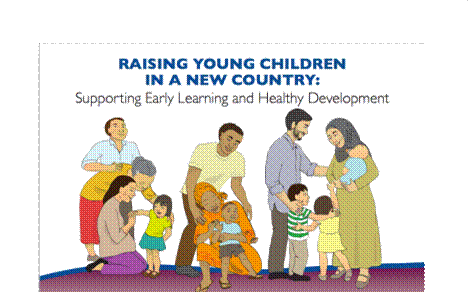Raising Young Children in a New Country:
Supporting Early Learning and Healthy Development
A rapidly growing demographic in the United States are children born to immigrant families. These children and their families may face a number of economic and social barriers as they grow and develop in their new surroundings. Some of these circumstances may open them up to issues such as violence exposure, problems with school readiness and access to services. However, many organizations are working to bridge this gap between services and immigrant and refugee communities by providing resources and guidance. Two examples of projects working toward this goal are the Bridging Refugee Youth and Children’s Services (BRYCS) Project and the Safe Start Center.
BRYCS does this through the provision of technical assistance between national organizations and immigrant and refugee communities in areas such as early childhood education and child welfare. A new handbook has been released, Raising Young Children in a New Country: Supporting Early Learning and Healthy Development. Check it out here.

The handbook is part of a larger joint effort by BRYCS, the Office of Refugee Resettlement, Head Start and the National Center on Cultural and Linguistic Responsiveness to create a larger Collaboration Toolkit of similar resources. It is designed for immigrant and refugee parents to use in conjunction with service providers to provide them with important early childhood information to help them adapt. This and other resources in the toolkit will provide families and communities with much needed information by looking at six important themes:
|
|
Family well-being Safety and protection Guidance and discipline Healthy brain development Early learning and school readiness Connecting to Early Care and Education |
The Safe Start Center also provides a great resource to help agencies working with immigrant families. The Trauma Informed Tips for Agencies working with Immigrant Families does this by sharing some of the potential warning signs of exposure to violence in children aged 0-18. It also gives agency staff important information to serve their clients, including tips on how to:
|
|
Screen for exposure to violence symptoms and mental health needs of children and their families on an ongoing basis. Refer families for comprehensive mental health assessments that include lifetime exposure to violence and acculturation stressors. Plan for individualized interventions that take into consideration traumatic experiences for both caregivers and children, which may be affecting the current family situation.
Expand the definition of “trauma-informed care” and “evidence-based
interventions”. |
